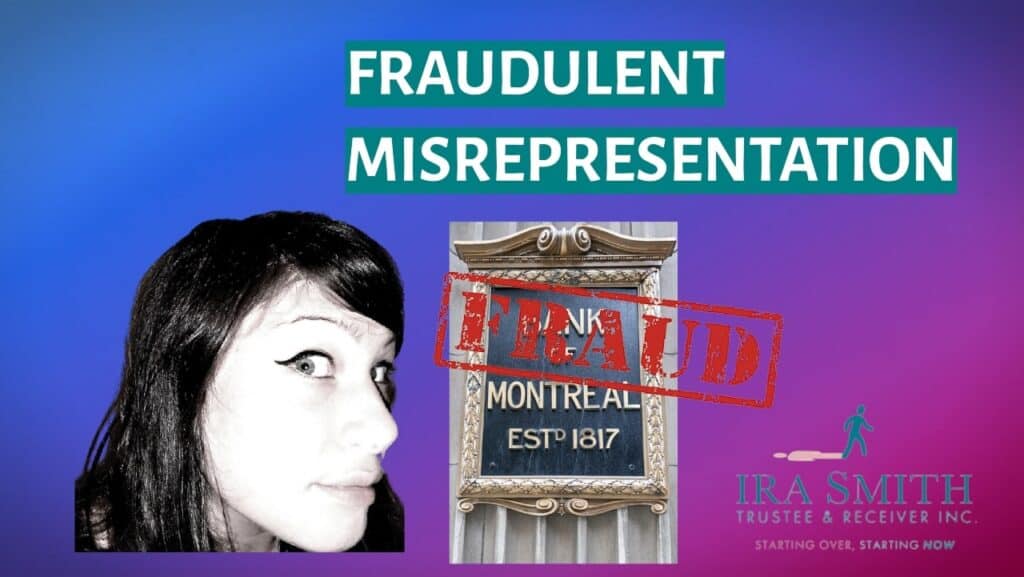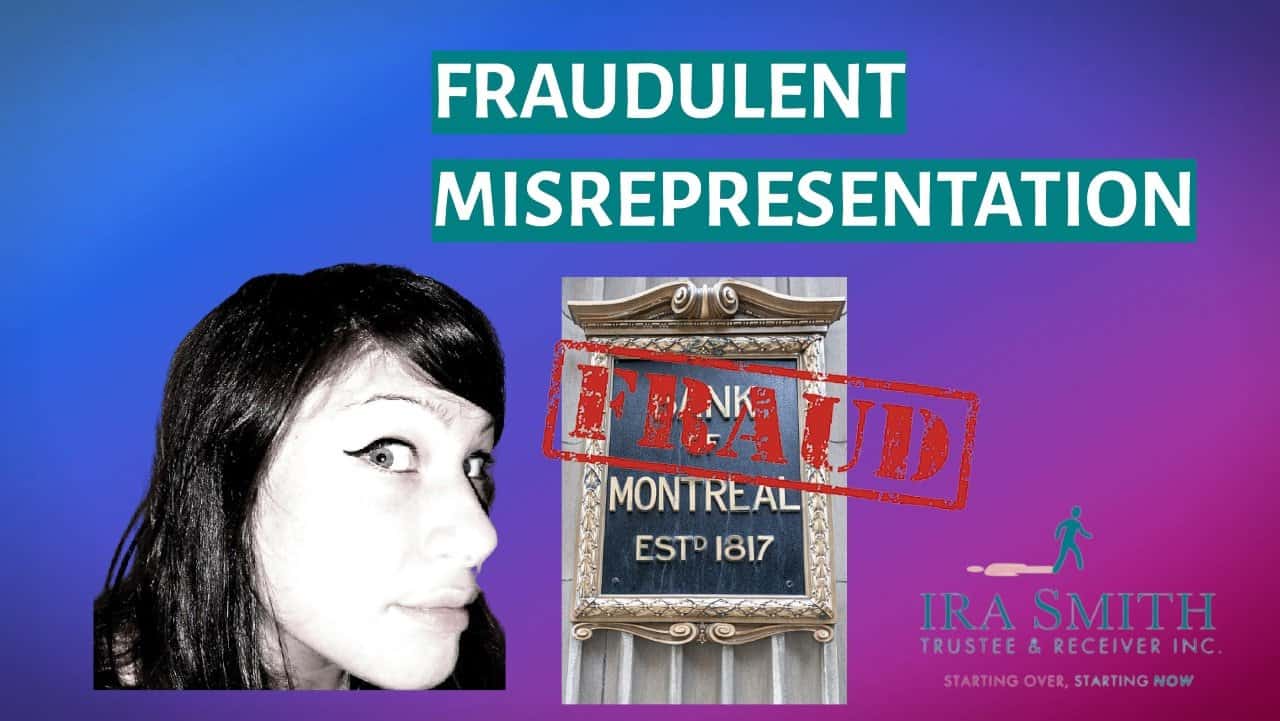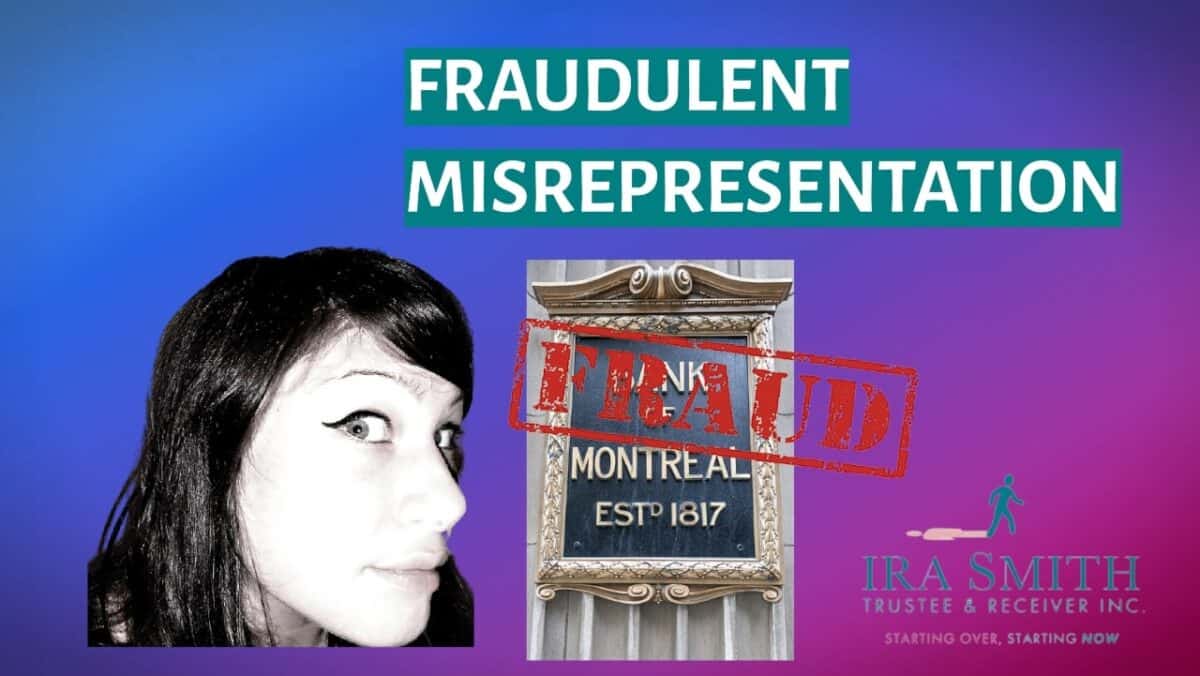An overview of fraudulent misrepresentation
Fraudulent misrepresentation can be incredibly damaging for the victim, both emotionally and financially. It occurs when someone makes a false statement about a material fact with the intention of inducing another person to rely on that statement, and the reliance causes damages.
Fraudulent misrepresentation is a civil wrong (tort) that can be the basis for a lawsuit. It can also be a crime, depending on the circumstances.
Anyone accused of fraudulent misrepresentation must speak to an experienced lawyer to discuss their case and the possible defences they may have.
Last week’s Brandon’s Blog, “MORTGAGE FRAUD IN CANADA: CANADIAN BANKRUPTCY CAN’T RELEASE YOU FROM A CORRUPT DEBT YOU CREATED“, I wrote about what mortgage fraud is and how it is perpetrated. I also described a recent decision of the Court of Appeal for Ontario on how anyone found guilty of mortgage fraud and had damages awarded against them will not be able to remove that debt by filing an assignment in bankruptcy.
I described how that kind of debt will not be discharged in bankruptcy because it is one of the exceptions outlined in section 178(1) of the Bankruptcy and Insolvency Act (Canada).
In this week’s Brandon’s Blog, I describe a recent decision of the Ontario Superior Court of Justice, Bank of Montreal v. 1886758 Ontario Inc., 2022 ONSC 4642. This case is about fraudulent misrepresentation, why that kind of debt will also not be released by the guilty individual’s discharge from bankruptcy and the court’s attitude to that issue.
What are the three types of misrepresentation?
Over the years, misrepresentation legal issues have been tried in court and the law has developed such that misrepresentation can be divided into 3 types; innocent, negligent and fraudulent. If there are no consequences for lying or omitting important information when entering into a contract, then agreements between parties to conduct business would become meaningless. The concept of misrepresentation is important in contract law.
The differences between the 3 types of false misrepresentation are as follows:
- Innocent misrepresentation: this is when someone makes a false claim or untrue statement but honestly believes that the false representation is true.
- Negligent misrepresentation: this is when someone makes a false claim without realizing that it is not true. They did not fulfill their duty of care when making statements to make sure they are or are not true.
- Fraudulent misrepresentation: this is when someone makes a false claim deliberately in order to deceive others.

fraudulent misrepresentation
What are the legal consequences of making false statements?
When you make a false statement, you may face civil or criminal consequences. Common examples of making a false statement are:
- in order to obtain or deny benefits arising from a contract, you may be guilty of fraud;
- making a false statement under oath in court, you may be charged with perjury;
- a false statement made that harms another person, you may be sued for defamation; and
- in order to commit or help someone who committed a crime, may be obstruction of justice or criminal conspiracy
In civil case matters, the party who has suffered damages as a result of the misrepresentation will be awarded a monetary award by the court.
The court case: What’s the process for suing someone for fraudulent misrepresentation?
The process used by the Plaintiff, Bank of Montreal (“BMO”) was a legal claim by starting a claim for misrepresentation and recovery of the debt owing by way of a Statement of Claim for a default judgment and related relief against 1886758 Ontario Inc. operating as Rejuv Medical (“Rejuv Medical”) and its Director, who was a guarantor of the loans to Rejuv Medical, in a debt collection and fraud action by BMO.
The aggrieved party, BMO, filed its motion seeking:
- An Order granting the Plaintiff default judgment as against the Defendants is issued in accordance with Plaintiff’s Statement of Claim. This includes a judgment in the aggregate sum of $442,723.36 as of June 29, 2021, plus accruing pre-and post-judgment interest from that date.
- Claims for damages seeking an award for punitive damages in the amount of $150,000.
- Substantial indemnification for all related costs, charges, expenses, and fees, including legal fees.
- Sole possession of the assets of Rejuv Medical.
- A declaration attesting that any amounts awarded by the court are debts resulting from obtaining property by false pretenses or fraudulent misrepresentation.

fraudulent misrepresentation
The evidence of fraudulent misrepresentation
BMO and Rejuv Medical entered into a letter agreement on November 16, 2020, under which BMO will provide three credit facilities:
- The first loan was for $350,000 under the Canada Small Business Financing Act, with interest at BMO’s prime rate plus 3.00% per annum.
- BMO provided a $120,000 operating loan to Rejuv Medical, payable on demand with interest at the bank’s prime rate plus 2.15% per annum. This loan is in addition to the existing business account and will help with short-term operating expenses.
- The third facility was a $30,000 commercial credit card agreement with an interest rate of 21.00% per annum.
BMO will only advance loan proceeds to eligible businesses for prescribed purposes, in accordance with the Canada Small Business Financing Act and its regulations. Accordingly, a loan applicant must specify and confirm how it will satisfy one of these prescribed purposes.
The principal of Rejuv Medical and guarantor of the proposed BMO credit facilities signed a Declaration on its behalf. The Declaration stated that the Borrower understands that, under the Canada Small Business Financing Regulations, loans cannot be made for certain purposes and under certain circumstances. To assist in the determination of whether a loan to the Borrower would be permitted under these regulations, the Borrower provided information to show that the first facility loan did qualify.
BMO learned later that the representations made were false and that the invoice provided as proof of purchase of qualifying equipment was a fabricated document.
At the time BMO determined that there were material inaccurate and false representations made by Rejuv Medical and its Director the guarantor, Rejuv Medical defaulted on its obligations to BMO for the loans.
What are the potential damages that could be claimed for fraudulent misrepresentation in this case?
The motion judge stated that the Borrower and guarantor being noted in default and not defending the action are taken to be an admission that Rejuv Medical and its Director:
- Never intended for the funds advanced to be used to purchase the equipment specified in the government loan program application process or the produced invoice.
- Had no record of purchasing the equipment specified in the invoice, or any comparable property or asset.
- Never intended to purchase the equipment in the manner represented, or at all.
- Did not establish the small business with the intention of operating it for an extended period of time or making a profit.
- Made false representations and declarations, knowing that they were false, without belief in their truth, or recklessly indifferent to whether the representations and declarations were true or false.
- Making this fraudulent misrepresentation caused damages as BMO suffered losses and damages, including the amounts owing for the loans.
Concerning the debt collection aspect of this case, the evidence established that the loans in question have gone into default and have not been repaid. Thus there was a breach of contract.
Based on this evidence, it is clear that Rejuv Medical owes and is liable to pay BMO $442,723.36 as of June 29, 2021, plus accruing pre-and post-judgment interest. As a fraud case, in addition to the amount of the loans and accrued interest to be paid, the court also awarded BMO $150,000 in punitive damages.

What are the 5 elements of a fraudulent misrepresentation claim?
The court emphasized that the five elements of a fraudulent misrepresentation claim are:
- a defendant made a false statement;
- with full knowledge that the statement was false, or with complete indifference to its truthfulness, the statement was made;
- the intent to deceive;
- the false statement being material and inducing the Plaintiff to act; and
- the plaintiff has suffered damages.
BMO did not seek a direction that its claim would survive a bankruptcy discharge, as the debt would fall within s. 178 of the Bankruptcy and Insolvency Act (Canada) (“BIA”). BMO made it clear that in the event the Defendants declare bankruptcy, it intends to rely on section 178 of the BIA.
You will recall from last week’s Brandon’s Blog, that section 178(1) of the BIA is the listing of the types of debts that are not released by a personal bankruptcy discharge. So if the guarantor ever declares bankruptcy, BMO’s debt will survive his discharge.
Section 178(1)(e) of the BIA specifically states that any debts or liabilities resulting from obtaining property or services through false pretenses or fraudulent misrepresentation will not be discharged through bankruptcy.
If the guarantor files for bankruptcy, BMO will seek an amendment to its judgment in order to declare that the debt still needs to be paid, and based on section 178(1) of the BIA, the debt will survive a discharge from bankruptcy. From my Brandon’s Blog of last week, it is evident that should the time come, BMO will get that further declaration.
You are not alone in this – get help from a Licensed Insolvency Trustee
I hope you enjoyed this Brandon’s Blog on fraudulent misrepresentation and how bankruptcy will not help the guilty defendant. Are you or your company in need of financial restructuring? Have you suffered damages because of reliance on false or misleading statements in business contract terms? The financial restructuring process is complex. The Ira Smith Team understands how to do a complex restructuring. However, more importantly, we understand the needs of the entrepreneur or the person who has too much personal debt. You are worried because you are facing significant financial challenges.
It is not your fault that you are in this situation. You have been only shown the old ways that do not work anymore. The Ira Smith Team uses new modern ways to get you out of your debt troubles while avoiding bankruptcy. We can get you debt relief freedom.
The stress placed upon you is huge. We understand your pain points. We look at your entire situation and devise a strategy that is as unique as you and your problems; financial and emotional. We know that we can help you the way we take the load off of your shoulders and devise a debt settlement plan.
We realize that people and businesses in financial difficulty need practical advice and a workable solution in an easy-to-understand financial plan. The Ira Smith Team knows that not everyone has to file for bankruptcy in Canada. Most of our clients never do, as we are familiar with alternatives to bankruptcy. We assist many people in finding the relief they need.
Call or email us. We can tailor a new debt restructuring procedure specifically for you, based on your unique economic situation and needs. If any of this sounds familiar to you and you’re serious about finding a solution, let us know.
Call us now for a no-cost initial consultation.


